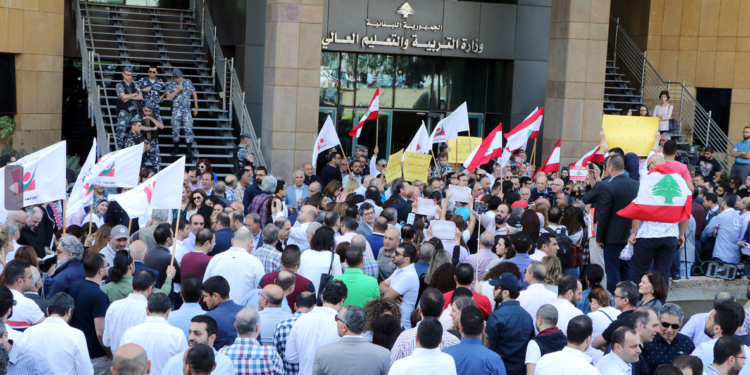Oct 1, 2024 Story by: Editor
Farai Makamba, a 27-year-old student from Zimbabwe, once kept his university textbooks on his desk at home in Beirut. Now, however, they have been replaced by his passport, travel documents, and cash.
“I have a plan for myself in case I need to leave urgently,” he explains.
Returning to Lebanon in September to complete his master’s degree in mechanical engineering, Mr. Makamba had spent the summer in Harare. He hoped that the ongoing conflict would ease. However, since Hamas launched an attack on settlers (Israel) on October 7, there has been almost daily cross-border violence between Israel and Hezbollah, the Iran-backed military group operating from Lebanon.
The past week has been one of the deadliest periods in Lebanon in nearly two decades, with Prime Minister Najib Mikati reporting that up to one million people have been displaced across the country.
Israel’s military claims it is conducting extensive strikes in southern Lebanon and the Beqaa Valley to dismantle Hezbollah’s infrastructure. The group’s leader, Hassan Nasrallah, reportedly died in an airstrike on Friday.
In a recent incident, 39 people lost their lives, and thousands were injured when explosive devices linked to Hezbollah members detonated across Lebanon. While Hezbollah accused Israel of responsibility, the latter has neither confirmed nor denied involvement.
Countries including the US, UK, Australia, France, Canada, and India have all urged their citizens to leave Lebanon as soon as possible.
African students are now facing a difficult decision: whether to remain in Lebanon amid the ongoing attacks or return to their home countries like Uganda, Zimbabwe, and Cameroon. At the American University of Beirut (AUB), where Mr. Makamba studies, there are around 90 African students on scholarship.
He notes a significant increase in anxiety among students, particularly following the recent explosions. “We don’t know who is carrying a ticking time bomb in their pockets,” he says. “Is it your taxi driver? Is it your Uber driver? Is it the person you are walking next to?”
Previously, Mr. Makamba’s days revolved around classes and socializing. Now, he only ventures out for essential shopping, acutely aware of the tension surrounding him. He has stocked up on necessities like bread, pasta, and bottled water, anticipating shortages.
With the campus closed, many classes have transitioned to online formats. “Everyone is nervous. Even the way we communicate is different,” he adds. “When we finish class, our professor now says: ‘Have a good day and stay safe.’ We reciprocate that sentiment because we understand the reality of our situation.” He concludes, “No one is safe.”
Public schools have also shuttered, with the Ministry of Education stating that these facilities are now being used to shelter those displaced by Israeli airstrikes in southern Lebanon.
The scholarship program for African students at AUB has granted international students the option to return home and complete their studies online. However, for some, that option is not viable.
Sharon Atyang, a 27-year-old from northern Uganda, is pursuing a master’s in community development at AUB. She voices concerns that electricity and internet issues at home would hinder her ability to study online. “I am also on a scholarship, and I don’t know if I travel home whether I would be allowed to return if the situation stabilizes,” she states.
Adele Pascaline, another student from Cameroon, faces similar challenges in completing her undergraduate radiology degree. “I cannot do my clinical rotations back home, but I need to finish them as part of my degree,” she explains. Despite the ongoing attacks, she has already purchased a return ticket.
The Mastercard Scholarship Program supports numerous African students in Lebanon. A representative from the Mastercard Foundation noted that they are closely monitoring the situation and collaborating with AUB to assist students. The spokesperson mentioned, “AUB is regularly communicating with the students and has offered support for their health and well-being. The academic curriculum remains flexible, and necessary accommodations have been made to ensure academic continuity for enrolled students. International students who wish to return home are supported to do so.”
Although it is still possible to leave Beirut via the international airport, securing tickets has become increasingly difficult as airlines like Emirates, Qatar Airways, Air France, and Lufthansa have suspended flights to and from the city.
From her room in Beirut, Ms. Atyang describes hearing the sonic booms of Israeli fighter jets overhead. “I was in a reading room when I heard the sound barrier breaking. I just ran, but I had nowhere to go. I ended up hiding in the toilet,” she recalls. The stress of the situation has left her feeling “emotionally and mentally unstable – [unable] to do anything.”
Amidst trying to focus on her studies and complete her thesis, Ms. Atyang is also fielding urgent calls from her family in Uganda. “They are demanding that I go back home, telling me I need to prioritize my life over academics,” she shares.
Some African governments have started evacuation efforts. Roseline Njogu, the Principal Secretary for Diaspora Affairs in Kenya, confirmed that nine Kenyans had returned home in August, urging others wishing to leave to register with the embassy. An estimated 26,000 Kenyans are currently in Lebanon.
Last month, Nebiyu Tedla, former spokesperson for Ethiopia’s Ministry of Foreign Affairs, stated that they are closely monitoring the situation and preparing evacuation plans if necessary. He added that approximately 150,000 Ethiopians reside in Lebanon, the majority working as domestic help, facing additional hurdles under the country’s strict kafala system that requires them to seek employer permission to leave.
For students like Mr. Makamba and Ms. Atyang, organizing an exit from Lebanon may be more straightforward. Yet, they are reluctant to leave before completing their studies. Both are expected to make a decision in the coming days.
Ms. Atyang underscores the unique challenges faced by African students: “You are on your own, and you have to take care of yourself,” she says. Source: BBC
















